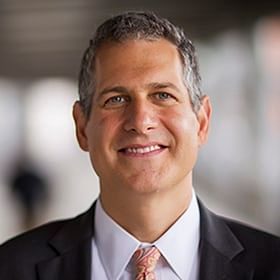Ethan Basch, MD talks today about a randomized clinical trial where 766 patients used a web-based system to self-report symptoms, triggering alerts to clinicians. The results were impressive. There are learnings and inspiration in this episode for anyone pursuing better patient outcomes, with special relevance for organizations rolling with a value-based care model.
Dr. Ethan Basch is an oncologist and Director of Cancer Outcomes Research at the University of North Carolina. His research group established that up to half of patients’ symptom side effects go undetected during cancer treatment and clinical trials, and that patient engagement and questionnaires substantially improve detection. His team determined that integrating web-based patient-reported symptoms into oncology clinical practice improves clinical outcomes and reduces health service utilization. His team created a system for the National Cancer Institute (NCI) to collect patient-reported side effects during cancer trials called the ‘PRO-CTCAE.’ Dr. Basch is also involved in efforts to bring PROs into comparative effectiveness research, routine care, and quality improvement. He is a member of the U.S. National Cancer Institute’s Board of Scientific Advisors, PCORI’s Methodology Committee, and is an Associate Editor at JAMA.
Dr. Basch will discuss results of a widely cited randomized controlled trial testing a “PRO intervention” in routine cancer care, that was a Plenary session at the ASCO annual cancer meeting and was published in JAMA earlier this year. In this trial, 766 patients receiving routine outpatient chemotherapy for metastatic solid tumors were randomly assigned to self-report 12 common symptoms via the web, or to usual care. Treating physicians received symptom printouts at visits and nurses received email alerts when participants reported severe or worsening symptoms. Overall survival was tabulated based on medical records and Social Security Death Index data, estimated using the Kaplan-Meier method, and compared between arms using a log-rank test and Cox proportional hazards regression adjusting for age, sex, race, education level, and cancer type. Cancer types included genitourinary (32% of patients), gynecologic (23%), breast (19%), and lung cancer (26%). Survival results were assessed after a median follow up of 7 years and 517/766 (67%) of participants had died. Median overall survival in the PRO intervention arm was 5.2 months longer than the control arm (31.2 vs. 26.0 months, p=0.03). These results demonstrate that systematic symptom monitoring during outpatient chemotherapy using web-based patient-reported outcomes confers overall survival benefits. These results are being further explored in a U.S. national implementation trial.
00:00 Ethan talks his work on a self-reporting symptom system.
02:20 The results of the self-reporting system trial.
03:00 Does using a self-reporting symptom system improve Clinical Outcomes?
04:30 Analyzing the data from this self-reporting system.
09:45 The improvements in Quality of Life this self-reporting study found.
10:20 The decrease in ER visits with self-reporting symptoms.
10:45 The extension of chemotherapy treatments self-reporting patients were able to achieve.
12:50 What inspired Ethan to take this sort of a project on.
13:15 The opportunity to improve the ability to detect patient symptoms.
15:30 Refining study techniques and approaches for successful trials.
19:20 Onboarding patients for studies.
24:15 Implementing the study from the Clinician side.
26:20 The requirements needed for onboarding staff onto a successfully implemented study.
29:45 The relevance to Value-Based Reimbursement.
31:00 The tangible impacts of catching symptoms early that increased the survival benefit of patient-reporting.
34:00 EP131, relevant insight from Zach Silverzweig of Cipherhealth.
36:00 A better way to monitor how patients are doing and improve the quality of care.
37:20 You can learn more about the study in the Journal of the American Medical Association & the Journal of Clinical Oncology.




